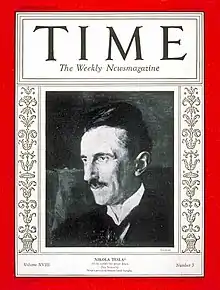Kenneth M. Swezey | |
|---|---|
| Born | June 11, 1904 Brooklyn, New York |
| Died | February 25, 1972 (aged 67) |
| Nationality | American |
| Occupation | Science writer |
| Known for | Science articles and books |
| Parents |
|
Kenneth Malcolm Swezey (1904-1972) was an American journalist. He was a science writer living and working in New York City.[1]
Biography
Kenneth Swezey was born in Brooklyn on 11 June 1904. His mother, Carrie, was 42 at the time and his father, Edwin L. Swezey, was 47. He had a sister, Martha, who was 13 years older and a sister, Anna, who was 25 years older.[2] From early on he wrote about science and technology, selling his first article, on how to make a wet cell battery, at age 11.[3] In his late teens he got a job writing a column on radio technology for the New York paper The Sun.[4] He would go on to contribute articles as a freelance writer for various magazines such as The Experimenter, Boys' Life, and Popular Science (a reappearing series of "Home Experiments" articles).[5] He would often illustrated his articles with photographs he shot himself. He lived with his parents up into his twenty's but by his thirty's he was living alone in a nearby residence on Milton Street in Brooklyn, New York. After World War II he wrote many books explaining scientific principles, sometimes equating them with everyday life and use in the home workshop. He died of a heart attack in 1972 at the age of 67.
Association with Nikola Tesla

Swezey met Nikola Tesla in the 1920s (sources differ whether it was 1921,[6] 1924,[7] or 1929).[8] Swezey thought the United States should honor Tesla and spent most of his life collecting the Serbian-American inventor's materials, writing about his inventions, and trying to memorialize him in other ways. This included organizing a celebration for the inventor's 75th birthday in 1931.[9] The event included congratulatory letters from more than 70 pioneers in science and engineering, including Albert Einstein,[10] and a feature on the cover of Time magazine.[11] He is associated with a "Tesla Society" that organized a 100th anniversary celebration of Tesla's birth in 1956. He also lobbied for ships, schools, and a unit of measurement to be named after Tesla as well as the issuing of a commemorative stamp.[12]
Publications
- Author (book): Formulas, Methods, Tips and Data for Home and Workshop, 1969
- Author (book): Science Shows You How, exciting experiments that demonstrate basic principles, McGraw Hill, 1964 (a book aimed at teenagers)
- Author (book): Chemistry Magic, 1956
- Author (book): After Dinner Science, Wittlesey House, 1949
- Author: "Experiments with Tesla Resonator", The Experimenter, July 1925, p 625
External links
References
- ↑ Guide to the Kenneth M. Swezey Papers, Smithsonian Institution, SOVA
- ↑ Kenneth Malcolm Swezey, findagrave.com
- ↑ The Home of Home Experiments (profile of Kenneth Swezey), Popular Science Jan 1949, page 286
- ↑ Guide to Manuscript Collections in the National Museum of History and Technology, National Museum of History and Technology, Smithsonian Institution Press - 1978, page 25
- ↑ The Home of Home Experiments (profile of Kenneth Swezey), Popular Science Jan 1949, page 286
- ↑ The Home of Home Experiments (profile of Kenneth Swezey), Popular Science Jan 1949, page 286
- ↑ Christopher Cooper, The Truth About Tesla: The Myth of the Lone Genius in the History of Innovation, Race Point Publishing - 2018, page 30
- ↑ Margaret Cheney, Tesla - Man Out of Time, Touchstone · 2011, page 278
- ↑ Kent, David J. (10 July 2012). "Happy Birthday, Nikola Tesla – A Scientific Rock Star is Born". Science Traveler. Retrieved 26 January 2019.
- ↑ "Time front cover, Vol XVIII, No. 3". 20 July 1931. Retrieved 10 September 2012.
- ↑ "Nikola Tesla | 20 July 1931". Time. Archived from the original on July 8, 2007. Retrieved 2 July 2012.
- ↑ Guide to the Kenneth M. Swezey Papers, Smithsonian Institution, SOVA